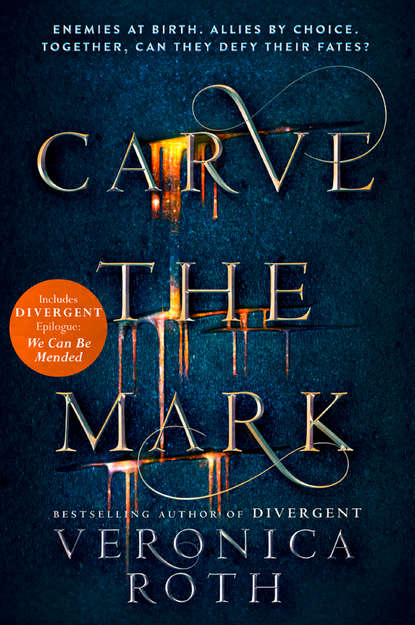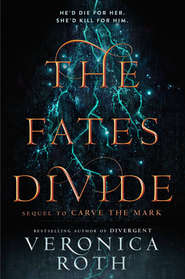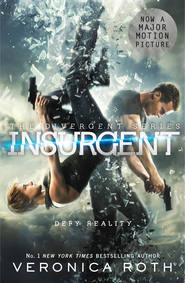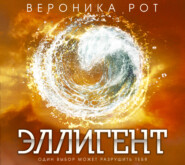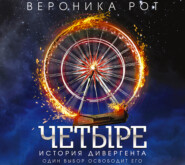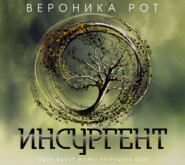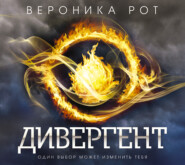По всем вопросам обращайтесь на: info@litportal.ru
(©) 2003-2025.
✖
Carve the Mark
Настройки чтения
Размер шрифта
Высота строк
Поля
THE FIRST TIME I saw the Kereseth brothers, it was from the servants’ passageway that ran alongside the Weapons Hall. I was several seasons older, fast approaching adulthood.
My father had joined my mother in the afterlife just a few seasons prior, killed in an attack during a sojourn. My brother, Ryzek, was now walking the path our father had set for him, the path toward Shotet legitimacy. Maybe even Shotet dominance.
My former tutor, Otega, had been the first to tell me about the Kereseths, because the servants in our house were whispering the story over the pots and pans in the kitchen, and she always told me of the servants’ whispers.
“They were taken by your brother’s steward, Vas,” she said to me as she checked my essay for grammatical errors. She still taught me literature and science, but I had outstripped her in my other subjects, and now studied on my own as she returned to managing our kitchens.
“I thought Ryzek sent soldiers to capture the oracle. The old one,” I said.
“He did,” Otega said. “But the oracle took her life in the struggle, to avoid capture. In any case, Vas and his men were tasked to go after the Kereseth brothers instead. Vas dragged them across the Divide kicking and screaming, to hear the others tell of it. But the younger one—Akos—escaped his bonds somehow, stole a blade, and turned it against one of Vas’s soldiers. Killed him.”
“Which one?” I asked. I knew the men Vas traveled with. Knew how one liked candy, another had a weak left shoulder, and yet another had trained a pet bird to eat treats from his mouth. It was good to know such things about people. Just in case.
“Kalmev Radix.”
The candy lover, then.
I raised my eyebrows. Kalmev Radix, one of my brother’s trusted elite, had been killed by a Thuvhesit boy? That was not an honorable death.
“Why were the brothers taken?” I asked her.
“Their fates.” Otega waggled her eyebrows. “Or so the story goes. And since their fates are, evidently, unknown by all but Ryzek, it is quite the story.”
I didn’t know the fates of the Kereseth boys, or any but mine and Ryzek’s, though they had been broadcast a few days ago on the Assembly news feed. Ryzek had cut the news feed within moments of the Assembly Leader coming on screen. The Assembly Leader had given the announcement in Othyrian, and though the speaking and learning of all languages but Shotet had been banned in our country for over ten seasons, it was still better to be safe.
My father had told me my own fate after my currentgift manifested, with little ceremony: The second child of the family Noavek will cross the Divide. A strange fate for a favored daughter, but only because it was so dull.
I didn’t wander the servants’ passages that often anymore—there were things happening in this house I didn’t want to see—but to catch a glimpse of the kidnapped Kereseths … well. I had to make an exception.
All I knew about the Thuvhesit people—apart from the fact that they were our enemies—was they had thin skin, easy to pierce with a blade, and they overindulged in iceflowers, the lifeblood of their economy. I had learned their language at my mother’s insistence—the Shotet elite were exempt from my father’s prohibitions against language learning, of course—and it was hard on my tongue, which was used to harsh, strong Shotet sounds instead of the hushed, quick Thuvhesit ones.
I knew Ryzek would have the Kereseths taken to the Weapons Hall, so I crouched in the shadows and slid the wall panel back, leaving myself just a crack to see through, when I heard footsteps.
The room was like all the others in Noavek manor, the walls and floor made of dark wood so polished it looked like it was coated in a film of ice. Dangling from the distant ceiling was an elaborate chandelier made of glass globes and twisted metal. Tiny fenzu insects fluttered inside it, casting an eerie, shifting light over the room. The space was almost empty, all the floor cushions—balanced on low wooden stands, for comfort—gathering dust, so their cream color turned gray. My parents had hosted parties in here, but Ryzek used it only for people he meant to intimidate.
I saw Vas, my brother’s steward, before anyone else. The long side of his hair was greasy and limp, the shaved side red with razor burn. Beside him shuffled a boy, much smaller than I was, his skin a patchwork of bruises. He was narrow through the shoulders, spare and short. He had fair skin, and a kind of wary tension in his body, like he was bracing himself.
Muffled sobs came from behind him, where a second boy, with dense, curly hair, stumbled along. He was taller and broader than the first Kereseth, but cowering, so he almost appeared smaller.
These were the Kereseth brothers, the fate-favored children of their generation. Not an impressive sight.
My brother waited for them across the room, his long body draped over the steps that led to a raised platform. His chest was covered with armor, but his arms were bare, displaying a line of kill marks that went all the way up the back of his forearm. They had been deaths ordered by my father, to counteract any rumors about my brother’s weakness that might have spread among the lower classes. He held a small currentblade in his right hand, and every few seconds he spun it in his palm, always catching it by the handle. In the bluish light, his skin was so pale he looked almost like a corpse.
He smiled when he saw his Thuvhesit captives, his teeth showing. He could be handsome when he smiled, my brother, even if it meant he was about to kill you.
He leaned back, balancing on his elbows, and cocked his head.
“My, my,” he said. His voice was deep and scratchy, like he had just spent the night screaming at the top of his lungs.
“This is the one I’ve heard so many stories about?” Ryzek nodded to the bruised Kereseth boy. He spoke Thuvhesit crisply. “The Thuvhesit boy who earned a mark before we even got him on a ship?” He laughed.
I squinted at the bruised one’s arm. There was a deep cut on the outside of his arm next to the elbow, and a streak of blood that had run between his knuckles and dried there. A kill mark, unfinished. A very new one, belonging, if the rumors were true, to Kalmev Radix. This was Akos, then, and the snuffling one was Eijeh.
“Akos Kereseth, the third child of the family Kereseth.” Ryzek stood, spinning his knife on his palm, and walked down the steps. He dwarfed even Vas. He was like a regular-size man stretched taller and thinner than he was supposed to be, his shoulders and hips too narrow to bear his own height.
I was tall, too, but that was where my physical similarities with my brother ended. It wasn’t uncommon for Shotet siblings to look dissimilar, given how blended our blood was, but we were more distinct than most.
The boy—Akos—lifted his eyes to Ryzek’s. I had first seen the name “Akos” in a Shotet history book. It had belonged to a religious leader, a cleric who had taken his life rather than dishonor the current by holding a currentblade. So this Thuvhesit boy had a Shotet name. Had his parents simply forgotten its origins? Or did they want to honor some long-forgotten Shotet blood?
“Why are we here?” Akos said hoarsely, in Shotet.
Ryzek only smiled further and responded in the same language. “I see the rumors are true—you can speak the revelatory tongue. How fascinating. I wonder how you came by your Shotet blood?” He prodded the corner of Akos’s eye, at the bruise there, making him wince. “You received quite a punishment for your murder of one of my soldiers, I see. I take it your rib cage is suffering damage.”
Ryzek flinched a little as he spoke. Only someone who had known him as long as I had could have seen it, I was certain. Ryzek hated to watch pain, not out of empathy for the person suffering it, but because he didn’t like to be reminded that pain existed, that he was as vulnerable to it as anyone else.
“Almost had to carry him here,” Vas said. “Definitely had to carry him onto the ship.”
“Usually you would not survive a defiant gesture like killing one of my soldiers,” Ryzek said, speaking down to Akos like he was a child. “But your fate is to die serving the family Noavek, to die serving me, and I’d rather get a few seasons out of you first, you see.”
Akos had been tense since I laid eyes on him. As I watched, it was as if all the hardness in him melted away, leaving him looking as vulnerable as a small child. His fingers were curled, but not into fists. Passively, like he was sleeping.
I guess he hadn’t known his fate.
“That isn’t true,” Akos said, like he was waiting for Ryzek to soothe away the fear. I pressed a sharp pain from my stomach with a palm.
“Oh, I assure you that it is. Would you like me to read from the transcript of the announcement?” Ryzek took a square of paper from his back pocket—he had come to this meeting prepared to wreak emotional havoc, apparently—and unfolded it. Akos was trembling.
“‘The third child of the family Kereseth,’” Ryzek read, in Othyrian, the most commonly spoken language in the galaxy. Somehow hearing the fate in the language in which it had been announced made it sound more real to me. I wondered if Akos, shuddering at each syllable, felt the same. “‘Will die in service to the family Noavek.’”
Ryzek let the paper drop to the floor. Akos grabbed it so roughly it almost tore. He stayed crouched as he read the words—again and again—as if rereading them would change them. As if his death, and his service to our family, were not preordained.
“It won’t happen,” Akos said, harder this time, as he stood. “I would rather … I would rather die than—”
“Oh, I don’t think that’s true,” Ryzek said, lowering his voice to a near whisper. He bent close to Akos’s face. Akos’s fingers tore holes in the paper, though he was otherwise still. “I know what people look like when they want to die. I’ve brought many of them to that point myself. And you are still very much desperate to survive.”
Akos took a breath, and his eyes found my brother’s with new steadiness. “My brother has nothing to do with you. You have no claim to him. Let him go, and I … I won’t give you any trouble.”
“You seem to have made several incorrect assumptions about what you and your brother are doing here,” Ryzek said. “We did not, as you have assumed, cross the Divide just to speed along your fate. Your brother is not collateral damage; you are. We went in search of him.”
“You didn’t cross the Divide,” Akos snapped. “You just sat here and let your lackeys do it all for you.”
Ryzek turned and climbed to the top of the platform. The wall above it was covered with weapons of all shapes and sizes, most of them currentblades as long as my arm. He selected a large, thick knife with a sturdy handle, like a meat cleaver.
“Your brother has a particular destiny,” Ryzek said, looking the knife over. “I assume, since you did not know your own fate, that you don’t know his, either?”
Ryzek grinned the way he always did when he knew something other people didn’t.
“‘To see the future of the galaxy,’” Ryzek quoted, in Shotet this time. “In other words, to be this planet’s next oracle.”





